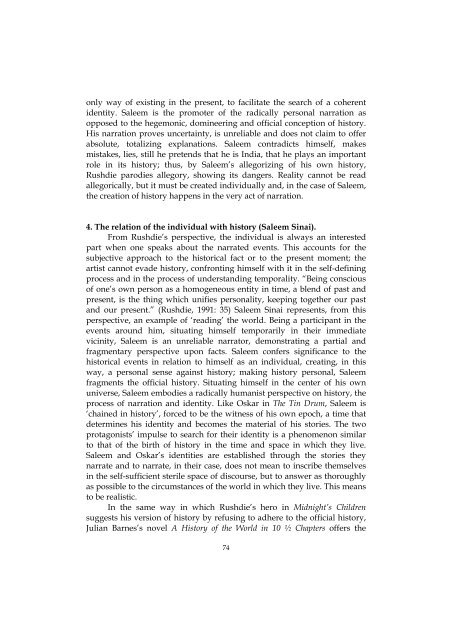translation studies. retrospective and prospective views
translation studies. retrospective and prospective views
translation studies. retrospective and prospective views
Create successful ePaper yourself
Turn your PDF publications into a flip-book with our unique Google optimized e-Paper software.
only way of existing in the present, to facilitate the search of a coherent<br />
identity. Saleem is the promoter of the radically personal narration as<br />
opposed to the hegemonic, domineering <strong>and</strong> official conception of history.<br />
His narration proves uncertainty, is unreliable <strong>and</strong> does not claim to offer<br />
absolute, totalizing explanations. Saleem contradicts himself, makes<br />
mistakes, lies, still he pretends that he is India, that he plays an important<br />
role in its history; thus, by Saleem’s allegorizing of his own history,<br />
Rushdie parodies allegory, showing its dangers. Reality cannot be read<br />
allegorically, but it must be created individually <strong>and</strong>, in the case of Saleem,<br />
the creation of history happens in the very act of narration.<br />
4. The relation of the individual with history (Saleem Sinai).<br />
From Rushdie’s perspective, the individual is always an interested<br />
part when one speaks about the narrated events. This accounts for the<br />
subjective approach to the historical fact or to the present moment; the<br />
artist cannot evade history, confronting himself with it in the self-defining<br />
process <strong>and</strong> in the process of underst<strong>and</strong>ing temporality. “Being conscious<br />
of one’s own person as a homogeneous entity in time, a blend of past <strong>and</strong><br />
present, is the thing which unifies personality, keeping together our past<br />
<strong>and</strong> our present.” (Rushdie, 1991: 35) Saleem Sinai represents, from this<br />
perspective, an example of ‘reading’ the world. Being a participant in the<br />
events around him, situating himself temporarily in their immediate<br />
vicinity, Saleem is an unreliable narrator, demonstrating a partial <strong>and</strong><br />
fragmentary perspective upon facts. Saleem confers significance to the<br />
historical events in relation to himself as an individual, creating, in this<br />
way, a personal sense against history; making history personal, Saleem<br />
fragments the official history. Situating himself in the center of his own<br />
universe, Saleem embodies a radically humanist perspective on history, the<br />
process of narration <strong>and</strong> identity. Like Oskar in The Tin Drum, Saleem is<br />
‘chained in history’, forced to be the witness of his own epoch, a time that<br />
determines his identity <strong>and</strong> becomes the material of his stories. The two<br />
protagonists’ impulse to search for their identity is a phenomenon similar<br />
to that of the birth of history in the time <strong>and</strong> space in which they live.<br />
Saleem <strong>and</strong> Oskar’s identities are established through the stories they<br />
narrate <strong>and</strong> to narrate, in their case, does not mean to inscribe themselves<br />
in the self-sufficient sterile space of discourse, but to answer as thoroughly<br />
as possible to the circumstances of the world in which they live. This means<br />
to be realistic.<br />
In the same way in which Rushdie’s hero in Midnight’s Children<br />
suggests his version of history by refusing to adhere to the official history,<br />
Julian Barnes’s novel A History of the World in 10 ½ Chapters offers the<br />
74












